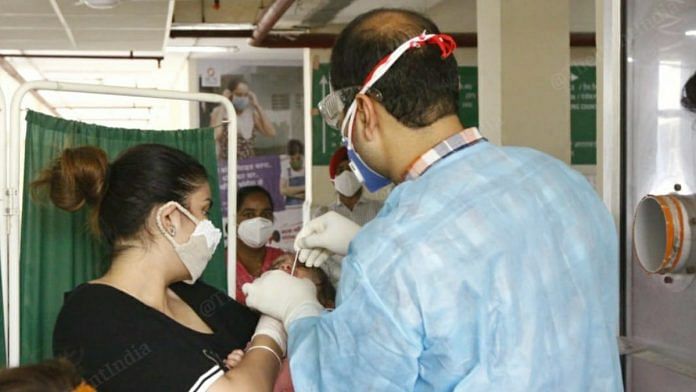New Delhi: Only six states have enacted a public health law, nine are in the process of formulating one, while eight have no plans to bring in any such law oriented towards providing protection and fulfilment of rights related to health and well-being, the central government informed the Supreme Court Monday.
The Ministry of Health and Family Welfare revealed this data before the top court during a hearing on a public interest litigation (PIL) to cap the prices for Covid-19 treatment in private hospitals.
On 31 August, a bench led by Chief Justice S.A. Bobde had directed the central government to advise all states and Union Territories (UTs) to formulate a legal framework, similar to the National Health Bill, 2009, which focuses on marginalised sections of society.
In the same order, the court had also asked the ministry to convene a meeting of all state health ministers or secretaries, and collate information regarding the steps taken by the states and UTs to frame the public health law.
Also read: BJP’s big vaccine promise in Bihar shows it has got its health priorities wrong
Only 6 states have public health laws
According to the ministry’s affidavit, Andhra Pradesh, Tamil Nadu, Goa, Uttar Pradesh, Madhya Pradesh and Assam have their own public health acts.
Both Tamil Nadu and Andhra Pradesh enforced the law in 1939 and have amended it from time to time. Madhya Pradesh’s law was put in place in 1949 whereas Goa formulated a public health act in 1985. In Uttar Pradesh, the law was framed in 2020, after the Covid breakout.
Meanwhile, Karnataka, Punjab, Sikkim, Odisha, Manipur, Jharkhand, Meghalaya, Maharashtra and the UT of Dadra and Nagar Haveli and Daman and Diu plan to enact such a law in the near future, the affidavit stated.
But West Bengal, Chandigarh, Jammu and Kashmir, Uttarakhand, Mizoram, Nagaland, Haryana and Andaman and Nicobar Islands have no plans to legislate a public health law.
Both Nagaland and Haryana had, however, proposed adopting the central government’s Act.
The affidavit doesn’t mention the remaining states and UTs.
According to advocate Sachin Jain, the petitioner in the case, a law to regulate healthcare services is needed to ensure health equity and justice.
“Health is a state subject under the Constitution. The existing public health system is not sufficient to look after the needs of citizens, warranting the states to evolve a mechanism to regulate private hospitals. There are several Supreme Court judgments that recognise healthcare as a fundamental right under Article 21,” Jain told ThePrint.
Also read: Modi govt begins building database of healthcare workers for Covid immunisation drive
‘National Health Bill essence of good governance’
In its 31 August order, the top court had noted how the central government had guided the states to frame their own public health act, on several occasions. Public health is a state subject and thus falls under state jurisdiction.
The central government made attempts twice, in 1955 and in 1987, to persuade states to pass legislations, based on what it called the ‘Model Public Health Act’.
However, the states did not act on the efforts. The government then made another attempt in 2009 through the National Health Bill.
The bench led by CJI Bobde noted that the preamble of the bill as well as the provisions, encapsulates the “essence of good governance in a welfare state”.
The court added: “It is heartening (or at least of interest) to note that the first word to be defined in the National Health Bill, 2009, was ‘affordable’.”
Labelled as a welfare legislation, the bill lays down minimum standards and appropriate regulatory mechanisms to provide free and universal access to healthcare services, public or private.
A healthcare establishment under the bill includes a private institution, which is operated or designed to provide inpatient or outpatient healthcare. It also defines words such as endemic, epidemic, healthcare provider etc.
Jain, however, argued that the central government’s affidavit is silent on what steps it has taken under the Disaster Management Act to advise states to legislate. The government has invoked the law to issue directives, such as the lockdown guidelines, amid the Covid pandemic.
“The 31 August order clearly said the Centre is unable to act for want of competence. However, the central government is empowered under the Disaster Management Act, 2005 to issue certain directions. But the government affidavit does not elaborate on this direction of the court,” Jain said.
Also read: Investing in public health most important lesson of Covid pandemic, says WHO chief scientist




It’s very strange that Health is categorized as State Subject under our Constitution.
Urge the Central government to correct this by amending the Constitution now that they are having absolute majority.